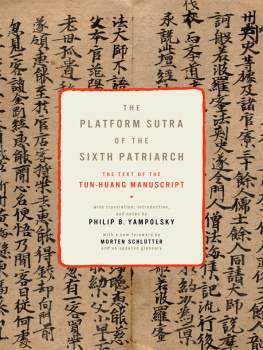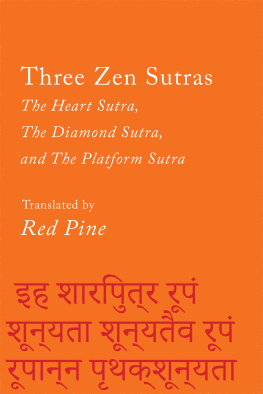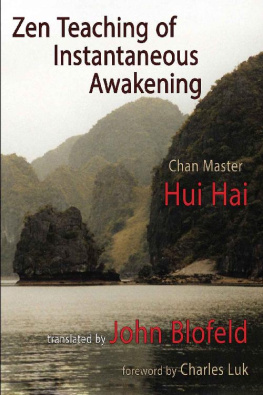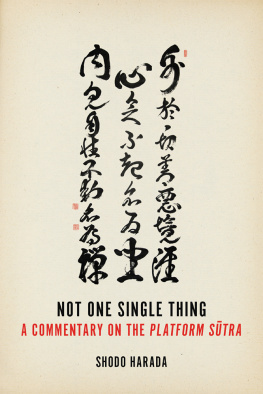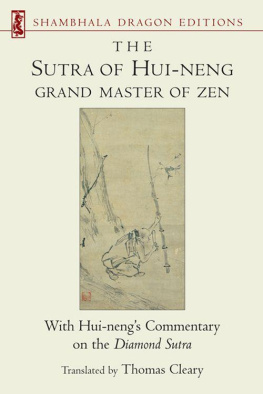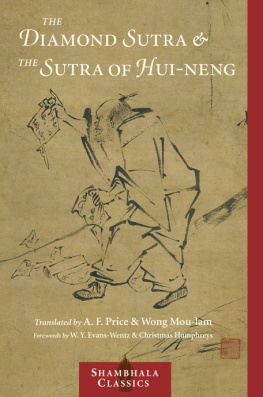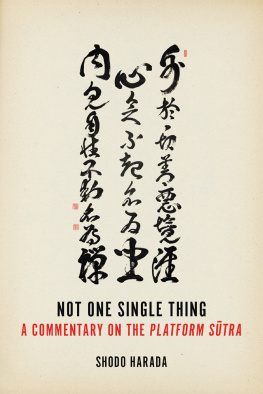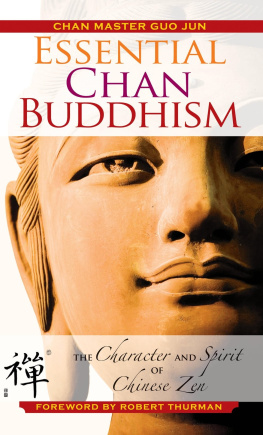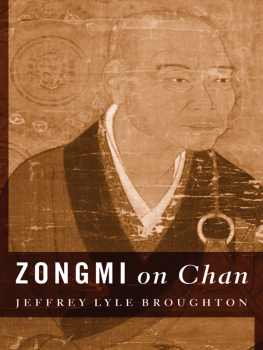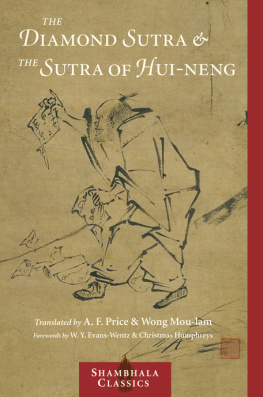The Platform Sutra of the Sixth Patriarch
TRANSLATIONS FROM THE ASIAN CLASSICS
TRANSLATIONS FROM THE ASIAN CLASSICS
Editorial Board
Wm. Theodore de Bary, Chair
Paul Anderer
Donald Keene
George A. Saliba
Wei Shang
Haruo Shirane
Burton Watson
Philip B. Yampolsky was a Lecturer in Japanese at Columbia University until his death in 1996. This study, prepared under the Graduate Faculties of Columbia University, was selected by a committee of those Faculties to receive one of the Clarke F. Ansley awards given annually by Columbia University Press.
Columbia University Press
Publishers Since 1893
New York Chichester, West Sussex
cup.columbia.edu
Copyright 2012 Columbia University Press
All rights reserved
E-ISBN 978-0-231-50134-7
Library of Congress Cataloging-in-Publication Data
Huineng, 638713.
[Liuzu da shi fa bao tan jing. English & Chinese]
The Platform sutra of the Sixth Patriarch: the text of the Tun-huang manuscript / with translation, introduction, and notes by Philip B. Yampolsky.
p. cm.(Translations from the Asian classics)
In English and Chinese; translated from Chinese.
Originally published: 1967.
Includes bibliographical references and index.
ISBN 978-0-231-15956-2 (cloth: alk. paper)ISBN 978-0-231-15957-9 (pbk.)
1. Zen BuddhismEarly works to 1800. I. Yampolsky, Philip B. (Philip Boas), 1920-1996.
II. Huineng, 638-713. Liuzu da shi fa bao tan jing. III. Title. IV. Series.
BQ9299.H854L613 2012
294.385dc23
2011019122
A Columbia University Press E-book.
CUP would be pleased to hear about your reading experience with this e-book at .
References to Internet Web sites (URLs) were accurate at the time of writing. Neither the author nor Columbia University Press is responsible for URLs that may have expired or changed since the manuscript was prepared.
To Yoshitaka Iriya
WIDELY READ AND RETOLD in East Asia since the eighth century, the Platform Stra of the Sixth Patriarch is a foundational text of Chan Buddhism (known in Japan as Zen). The origins of the text can be traced back to the beginnings of Chan itself in seventh-century China, but for centuries the only known editions of the Platform Stra dated to 1290 or later. However, in the first decades of the twentieth century an early manuscript of the Platform Stra was found in a hidden temple library at Dunhuang in western China. This text, dating to ca. 780 and in many ways quite different from the later versions, is an invaluable source for understanding the early development of Chan Buddhism. The present reissue of Philip Yampolskys study and translation of the Dunhuang manuscript, originally published in 1967, will be of great value to anyone interested in the origins and early evolution of Chan Buddhism in China and the foundations of later Chinese Chan and Japanese Zen, as well as Korean Sn.
The Dunhuang Platform Stra is an exciting and inspiring text that still has the power to capture an audience well over a thousand years after its composition. Created at a time when Chan only recently had become a self-aware movement, and when issues of who held the true patriarchal succession and what constituted the true Chan teachings had come to the fore, the text affords us a window into both doctrinal innovations and factional struggles within the nascent Chan school. At the core of the Platform Stra is the dramatic story of how a poor and despised commoner by the name of Huineng becomes the sole heir to an exalted lineage of enlightened Chan patriarchs going all the way back to the Buddha himself. Cast as a recorded sermon addressed to both monastics and laypeople, the text has Huineng first tell his own story, then deliver a number of often startling teachings that seem to reject seated meditation, dismiss the value of seeking merit, and repudiate worship of the buddhas. In addition, Huineng personally confers a set of formless precepts on the members of his audience, a ceremony in which the readers of the Platform Stra are also invited to participate through embedded notes in the text. The innovative format of the Platform Stra and its dramatic story, provocative teachings, and affirmation of the validity of lay practice have ensured its survival over many centuries and made it a popular text among monastics and laypeople alike.
The central message of Huinengs teachings in the Platform Stra is that inherent buddha nature is the original true condition of all sentient beings, right here for clear-eyed monastics and laypeople to experience for themselves. This is a teaching that requires an uncompromising nondualism because, paradoxically, to seek the buddha nature is to separate oneself from it. How best to express this and how to lead practitioners toward an insight into their own true nature was an ongoing struggle for the Chan school and caused its teachers to experiment with different rhetorical strategies. Over time, this led to a number of new developments within Chan that are reflected in later versions of the Platform Stra, which became longer and more detailed as time passed. The final version of the Platform Stra that came to be considered canonical in the thirteenth century is more than twice as long as the Dunhuang version. The study of the Dunhuang version of the Platform Stra allows us to return to the roots of Chan, so to speak, and appreciate the basic message that became the foundation for later developments.
Philip Boas Yampolsky (19201996) was a leading scholar of Chinese and Japanese Buddhism, especially well known for his translations of Zen Buddhist texts. Most of his academic career was spent at Columbia University, from where he received his Ph.D. in 1965. The grandson of the legendary anthropologist Franz Boas (18581942), Yampolsky began his study of Japanese when he was trained as a translator in the U.S. Navy during the Second World War. Later, he received a Fulbright scholarship to study Buddhism in Japan, where he lived from 1954 to 1962. During this time, Yampolsky was part of the Zen research group organized by Ruth Fuller Sasaki (18921967), and came in close contact with Yanagida Seizan and Iriya Yoshitaka, who later emerged as Japans leading Zen scholars. Yampolsky returned to the United States in 1962 to continue his studies at Columbia University. He soon began working at the East Asian Library at Columbia, of which he became the head in 1968. He was named a full professor of Japanese in 1981. Yampolsky retired from Columbia in 1990 but continued as a special lecturer until 1994.
The publication in 1967 of Yampolskys analysis and translation of the Dunhuang manuscript of the Platform Stra was a monumental event in the study of Zen Buddhism in the West. Although the longer thirteenth-century version of the Platform Stra had been translated into English in 1930, the Dunhuang Platform Stra and the story of early Chan that especially Japanese scholars had begun to unravel were not well known among Western academics and others interested in Chan/Zen Buddhism. Yampolskys erudition, his great skill with Buddhist classical Chinese, and his thorough knowledge of Japanese Zen scholarship enabled him to produce a book at a level not previously achieved in Western Zen studies. In an age when the study of Zen in English was dominated by popular books by writers like D. T. Suzuki and Alan Watts, Yampolsky demonstrated how critical and careful scholarship could significantly advance our understanding and appreciation of Chan and Zen. In many ways, Yampolskys Platform Stra signaled a new era in Western Zen studies where Chan/Zen became the object of serious academic inquiry. Yampolsky himself helped train a new generation of scholars, and his impact on Buddhist studies is still very present.
Next page
